Ellis Island Through the Lens: A Photographer’s Account of Immigrant Life (1908)
📌 Explore the immigrant experience at Ellis Island in the early 1900s through Julian A. Dimock’s firsthand account and powerful photography. This article offers historical insights into the human stories behind the immigration process.
"Ellis Island As Seen By The Camera Man"
In the article "Ellis Island As Seen By The Camera Man", originally published in The World Today in April 1908, Julian A. Dimock provides a vivid and personal account of the immigrant experience at Ellis Island. Through both his photography and observations, Dimock captures the complex emotions, the human drama, and the bureaucratic procedures that shaped the immigrant journey to the United States.
This article is a valuable resource for educators, students, genealogists, historians, and others interested in the immigration experience, offering unique insights into the early 20th-century policies and practices at one of America’s most iconic immigration centers.
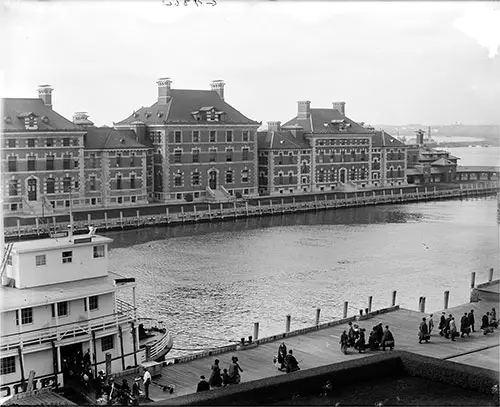
Immigrant Landing Stage at Ellis Island. Tender Brings New Immigrants to Ellis Island for Processing. nd circa 1910s. Detroit Publishing Company # 0500726. Library of Congress # 2016796928. | GGA Image ID # 14824f206a
Signora! Signora! Go up to the top of the stairs." One of the interpreters spoke, and he added to an attendant, "Put the woman and the baby at the head of the line."
We were looking down the main stairway of the receiving room at Ellis Island at the line of immigrants waiting to pass the medical examiners. Something had delayed the inspection, and this row of people was standing where they were struck by the chilly blasts that swept up through the open doors.
In speaking thus, the official voiced the attitude of the immigration authorities toward the arriving alien, as I had seen during ten days of unattended observation.
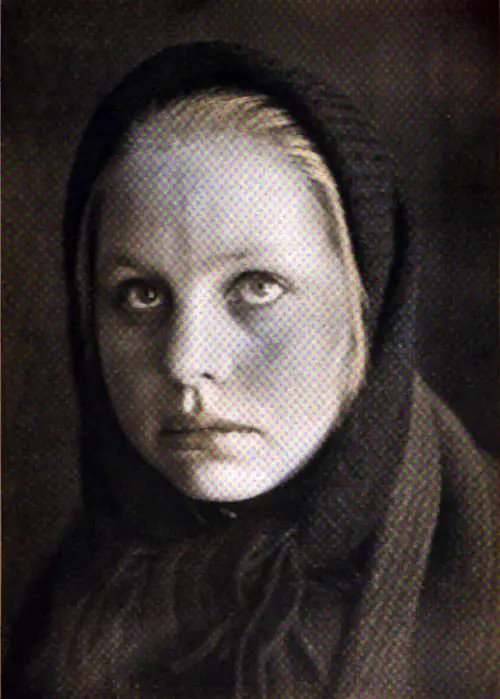
The Face of an Immigrant. Faith And Hope In The Future - Terror And Timidity In The Past. The World Today, April 1908. | GGA Image ID # 21908cbabc
A tale is told of an unscrupulous pie vendor who, years ago, refused to give change to a little immigrant boy who had purchased one of his wares. That lonely boy then resolved that when he grew up, he would put it out of the power of such men to prey on the newly landed foreigner.
When President Roosevelt looked around for a man who would give the immigrant a square deal, he found this boy, now grown to man's estate, with proper experience in the service, and appointed him Commissioner of Immigration at the Port of New York, "solely on merit."
The literal accuracy of this story is immaterial. Its spirit is true today. The personality of the Commissioner, thus appointed, permeates the department under his charge.
For nearly two weeks, I watched the stream of humans coming up the stairs and saw how the officials treated them. Scarcely, I heard a crossword during that time. Once, one of the interpreters relieved his feelings with a long-drawn-out "stupid," which sounded to all the world like a mother speaking to a provoking child. I watched the expression on the face of one of the inspectors as he tried to straighten out some slight irregularity in the papers of a woman at his desk.
Although I was across the room and heard not a single word, I was much impressed by his look of fatherly solicitude as he sought to temper the severity of our alien laws with kindness to the foreigner at our gateway. The interest of the immigrant was promoted so far as was compatible with justice in the country. During the interview, the baby shuffled away from his mother, and the gentle way he romped to her side completed the picture of applied Christianity.
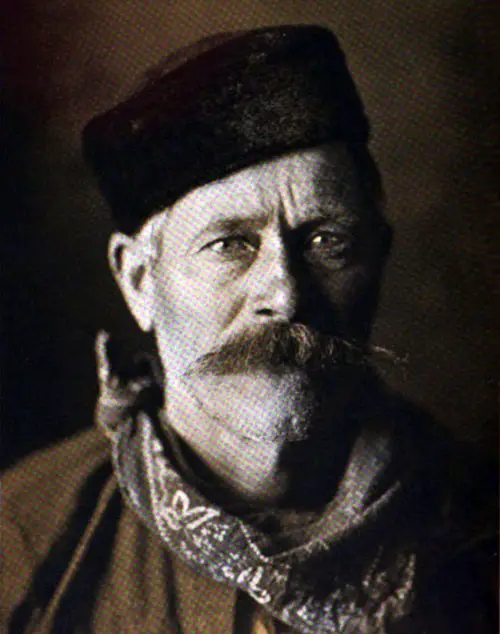
A Potential Immigrant Waits In The Detention Room at Ellis Island. The World Today, April 1908. | GGA Image ID # 2190ec5827
One day, while I was there, a woman lost her $70 before she reached the inspectors. The $70 was a fortune to her, and its loss meant the closing of the Gates of Hope. When her tale was known, the officials took up a collection to enable her to pass.
"They often try this trick, but this woman is telling the truth and does lose her money," said one of them.
At another time, the noon hour found the room filled with immigrants awaiting inspection. One woman with two small children was waiting for her husband, who chanced to be further down the line. The motherly air with which one of the matrons swooped down on the group and carried it off to lunch emphasized the feeling of humanity I had now expected at Ellis Island.
The women's care extends beyond the entrance portals. I saw one attractive young woman bathed in tears. Still, the adamantine officials refused to allow her to change her plans and seek a situation in New York City, where she had no friends. She was consigned to cousins in Pennsylvania, and in Pennsylvania, she was sent.
The receiving and examining department is optimistic; the deportation department is pessimistic. One official spoke to me of the lies told by the Special Inquiry Boards, often to enable the immigrant to enter this country and begin over again a life that has failed—if we take a charitable view of the case.
In one department stalks tragedy—grim and unrelenting. And yet I wonder if some of His charity, who accepted Mary Magdalen's ministrations, might not have served to save many human beings from misery without a severe threat to the community's morals, for I remember the home where childish prattle in the kitchen, tolerated by the liberal-minded homemaker, led to an honorable and happy marriage.
At Ellis Island, the subject is viewed from the standpoint of physical inability to work and the certainty that, too often, the doors of honest labor will be closed in the face of the applicant. The husband must be able to provide for his wife and child; the lover must be made to go through the marriage ceremony and be able to care for the family, or the Department of Deportation is put in charge of the case. The fate of the deported is often of such sadness that the department should exercise all possible consideration.
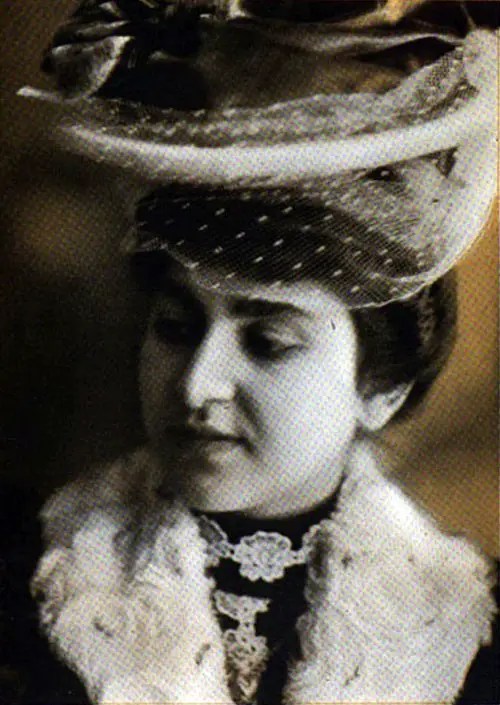
Beautiful Romanian Woman From Bucharest at Ellis Island. The World Today, April 1908. | GGA Image ID # 21913030bb
My work with the camera took many days, for I was determined to have the chosen types represented. I tried to select an equal number of good and evil. For one whole day, I devoted myself to photographing the poorest specimens I could find, resolutely leaving all the pretty girls and fine-looking men out of it. After a week, I gave up the attempt, for there were no wrong types or so few as to be negligible.
A cherished example of the undesirable developed into a picture of the conventional Christ-head. After that, I devoted myself to typical people without regard to character, but I always avoided the best-looking ones lest the result compare too favorably with the work at a Fifth Avenue studio.
I made amusing mistakes. After exhausting my knowledge of the sign language in directing the posing of one of the men, he asked me in English, "Are my eyes right now?" Further, talk with him — not with signs, however — disclosed that he was an Iowan fanner who had returned to his old home for a bride and was now bringing her to their new home in this country. When he introduced me to her, I no longer wondered why he went abroad for a wife.
A stately white-haired patriarch stood at the head of one group. Every line that seamed his face, every glance from his kindly eyes, and every attitude of the man proclaimed an intellectual, refined, distinguished personality. The inspectors' inquiry revealed that these were second-cabin passengers whose relatives had not met them at the steamer.
They were now awaiting, at the Island, a reply to the telegram announcing their arrival.
The officials were as pleasant to me as their charges, with greetings ranging from "Well, son, how goes it this morning?" to "For God's sake, keep at it and get through. I am responsible for all these people, and it makes the shivers run down my back whenever you take one outside the railing!" in answer to my suggestion that I absent myself on a day that promised to be full to overflowing.
Quickly, I learned which interpreter could best attract the beautiful girls into posing with his, "Will you go with him to the window?"
"No, Mademoiselle, he asks you because you are so pretty!" I discovered which could prevail upon the aristocratic-looking men and which the rank and file. To one, it was "Come!" he came; to another, "This gentleman wishes to take your picture; will you permit him?"
The reception was as varied as the sitter. The "Count," as we called him, was profuse in expressions of his appreciation of the honor done him. He told me that he was "a portrait painter, himself."
He borrowed a pencil to give me his address. After returning to his place, he discovered that he still had the pencil. Officials were waved aside as he hastened across the room, and with a courtly bow and many apologies, he gave it back to me.
The Hebrews retained their air of submission. On his return to his companion, one was asked, "What did he want, Jacob?" With a Hebraic shrug, he replied, "I know not, Isaac; he took my picture, and that was all!"
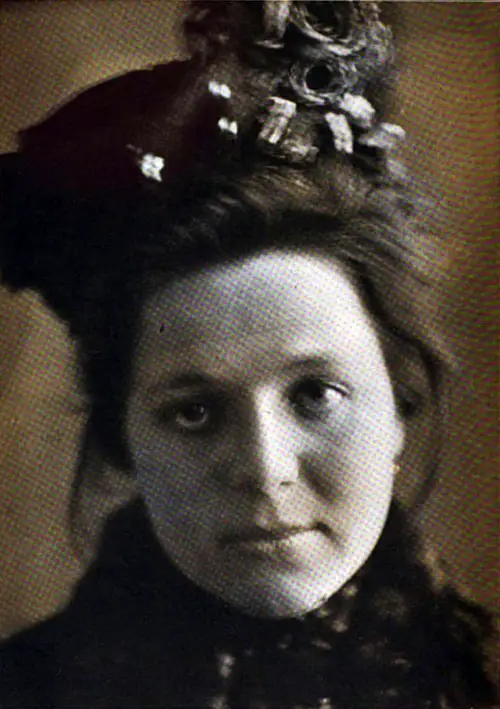
Bride Of An Iowan Farmer Coming To Her New Home via Ellis Island. The World Today, April 1908. | GGA Image ID # 219159ddac
In the railroad waiting room, I saw a homesick man forget his loneliness in the abandon of playing his fiddle. Gone were the four walls of the building. Forgotten were the medical examiners and the dreaded inspectors! The spell of the music again brought the vine-clad hills of sunny Italy before him.
Even in the detention room, apprehensions are momentarily forgotten. In one department, a drum beat banished the dread of their fate from volatile people who swayed to the time. With the women, chatting, sewing, and quiet games whiled away the hours. The lottery of the future contains prizes for some but blanks for many.
Some are detained for sailing the steamer to bear them back whence they came. A few await the return of sick children from the hospital or a message that they will never come back. Others are held for the coming of friends who failed to meet them at their arrival.
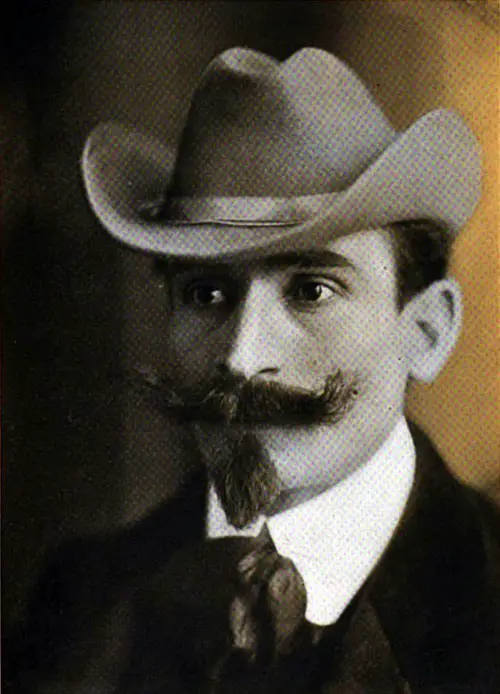
The Count - A German Portrait Painter at Ellis Island. The World Today, April 1908. | GGA Image ID # 219192e413
I needed help in maintaining a proper perspective. Continually, I found myself forgetting that these people were not simply human beings, members of the human brotherhood who, by a mere freak of fate, were born in a foreign clime, but beings apart whom we must consider and weigh before we admit them to the privileges of the country. As the way to the ferry led me through doors that bore the legend "Push. To New York," and on the other side, I passed through doors printed "Pull," I thought with sorrow of the significance of the words.
Later, on the subway, I headed the line of passengers who wished to leave the train at Fourteenth Street. On the platform was a dense mass of well-dressed, well-appearing men and women.
I did not see a motion to make a passage. I stopped, bewildered, for I had just left a region where courtesy was the rule. Fortunately, the man behind me was a citizen of the metropolis. With his shoulder at my back, we went through that crowd, which melted before the brute force it was accustomed to. Again, I felt sorry for the immigrants whom I had just left, for they must now learn the significance of the two American watchwords, "pull" and "push."
Those who best know the immigrant are his most potent advocates. The Commissioner, under whose eye five thousand new arrivals pass daily, said to me as we watched the endless procession, "Look at those hands, toil-worn and hardened with work in the fields. These men come here looking for hard work, and they find it.
That is the sort of people that this country needs." One of the best-known missionaries at Ellis Island expresses her faith in the alien: "I have been in work nearly nineteen years, and each year increases my faith in humanity." A great southern state is seeking to direct immigration to its own borders—and this after investigation!
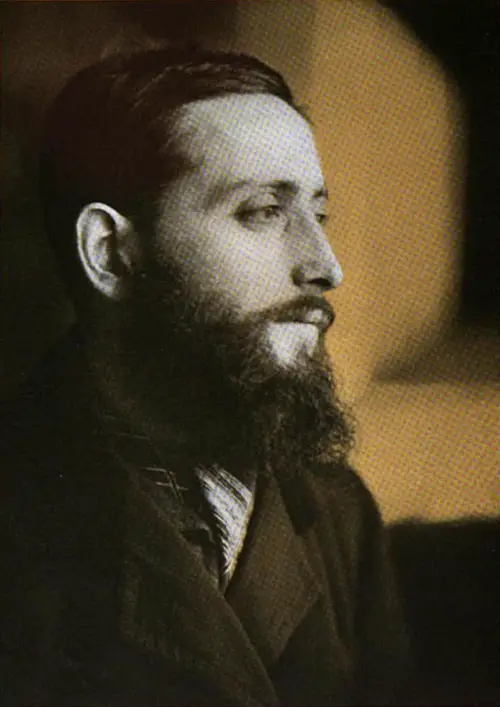
Model For The Conventional Christ - Head Of The Artist Who Passed Through Ellis Island. The World Today, April 1908. | GGA Image ID # 21927a2ded
Too often, the class that laments the influx of these humble people holds up its dainty skirts when it visits Ellis Island as one of the "sights" of New York.
Dimock, Julian A., "Ellis Island As Seen By The Camera Man," The World Today, Volume XIV, No. 4, April 1908.
Relevance to Immigration Studies
This article is an excellent tool for anyone studying the U.S. immigration process in the early 20th century. It offers firsthand observations of Ellis Island during a time when millions of immigrants passed through its gates. The combination of photographic documentation and the writer’s detailed descriptions provides a comprehensive understanding of the immigrant experience, the role of immigration officials, and the complexities of assimilation. The article also presents a nuanced view of Ellis Island not only as a checkpoint but as a microcosm of broader societal attitudes toward immigration.
Key Highlights and Engaging Content
Immigrant Experiences
One of the most compelling aspects of this article is Dimock’s portrayal of the immigrants themselves—capturing both their vulnerability and resilience. He describes how they were greeted with care, such as the moment when an official intervened to allow a mother with a child to go to the front of the line.
The story of a woman who lost her $70 is another poignant moment, showing the personal hardships many immigrants faced even before reaching Ellis Island. These human moments emphasize the emotional toll of immigration, making this account more than just an exploration of the logistics of processing newcomers.
The Role of Ellis Island Officials
Dimock's observations also bring attention to the compassion shown by many of the Ellis Island staff. He notes how officials handled the immigrants with care, trying to balance the cold logic of immigration laws with a more humane approach.
The description of a compassionate officer dealing with a woman’s irregular documentation or a matron ensuring that a mother with children is well taken care of brings to light the more personal side of the immigration process. This human interaction at Ellis Island is contrasted with the often grim and bureaucratic nature of the institution.
Noteworthy Images
The accompanying photographs provide a powerful visual complement to the narrative, making this article particularly valuable for historical research. The images, including:
📸 "Immigrant Landing Stage at Ellis Island"
This photograph shows the tender that brought new immigrants to Ellis Island, offering a glimpse into the initial stage of their journey.
📸 "The Face of an Immigrant"
This evocative image captures the emotions of an immigrant, conveying both hope for the future and the terror of an uncertain past.
📸 "Bride of An Iowan Farmer Coming to Her New Home via Ellis Island"
A striking image that shows the personal connections and stories behind the immigration process, humanizing the broader narrative.
These photos deepen the impact of Dimock’s observations, highlighting the personal stories behind the statistics and laws.
The Immigrant’s Struggle and the American Dream
Dimock also touches upon the broader theme of the immigrant’s journey in search of a better life. He contrasts the hopeful attitudes of the immigrants with the sometimes harsh realities they faced in the U.S.
The article reflects a recurring theme in American immigration history—the belief in the American Dream versus the struggles of adaptation and survival. His observations, including the moving story of a man playing the fiddle to ease his homesickness, showcase the emotional complexity of the immigrant experience.
Educational and Historical Insights
Immigration Procedures
The article offers an in-depth view of the bureaucratic procedures at Ellis Island, from medical examinations to the process of detainment and deportation. These insights are valuable for educators who wish to explain the technical aspects of the immigration process and the challenges faced by those attempting to enter the U.S. The examination of physical and mental health, the procedures for those deemed undesirable, and the various categories of exclusion provide critical historical context.
Class and Ethnicity
Dimock’s experiences with different immigrant groups—whether the poor, the well-dressed, or the professional—highlight the diversity of the immigrant population at Ellis Island. This diversity, along with his direct commentary on how officials interacted with various individuals, raises important questions about class and ethnicity.
Dimock's observation that "there were no wrong types or so few as to be negligible" challenges stereotypes and underscores the complexity of immigrant identities.
The Emotional Toll of Immigration
The emotional weight of the immigration experience is captured powerfully throughout the article. Dimock’s perspective provides readers with an intimate look at the tension, homesickness, and uncertainty felt by many immigrants, as well as the compassionate actions of the officials and staff that helped mitigate some of these burdens.
This article is an excellent resource for understanding the personal side of immigration, an aspect often overshadowed by the political and economic discussions surrounding immigration policy.
Final Thoughts
Ellis Island As Seen By The Camera Man offers both a historical and human perspective on the immigration process. Dimock’s thorough observations and the accompanying photographs give a nuanced portrayal of the immigrant experience during a time of great societal change.
His emphasis on the complexities of Ellis Island—where hope and despair, bureaucratic processes and human kindness, collided—provides valuable insights for anyone interested in immigration studies, whether from a historical, educational, or genealogical perspective.
This article remains relevant to contemporary discussions on immigration, as it illustrates the enduring challenges faced by immigrants and the importance of empathy and fair treatment in a system often marked by strict regulations.
🔎 Research & Essay Writing Using GG Archives
📢 This is NOT a blog! Instead, students and researchers are encouraged to use the GG Archives materials for academic and historical research.
🔎 Looking for primary sources on Titanic’s lifeboat disaster? GG Archives provides one of the most comprehensive visual collections available today.
